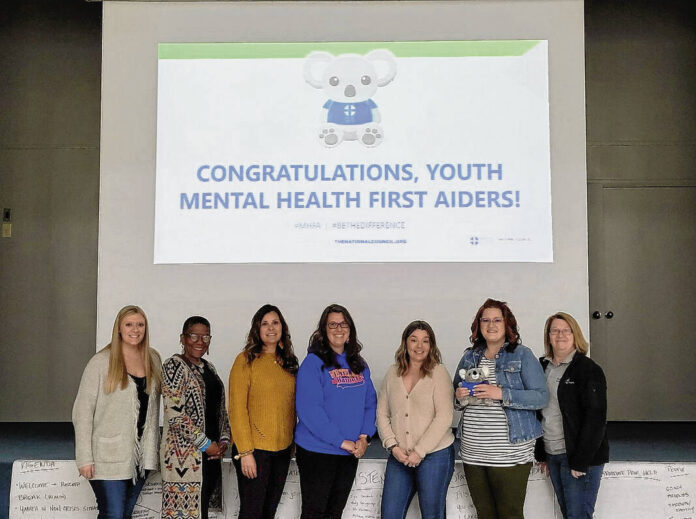A mental health crisis is looming over Johnson County.
Data from Mental Health America’s online screeners in 2020-2021 showed that 87 people per 100,000 in Johnson County have severe depression and 80 per 100,000 reported frequent suicidal ideations.
One in five youth experience a mental health challenge. The youth suicide rate in Indiana for teens age 15 to 18 doubled between 2019 and 2020.
“It’s really tragic and alarming what our youth is going through,” said Hope Thompson, project coordinator for Upstream Prevention. “It was already not looking good before the pandemic, and the pandemic only made it worse.”
Local mental health officials are working to address these issues, with particular focus on assisting young people who are experiencing a mental health challenge. Upstream Prevention has organized a Youth Mental Health First Aid course, training adults who regularly interact with people ages 12 to 18 so that they can help youth in crisis.
“Just like first aid for anything, it focuses on how you intervene, briefly, in the moment — whether it’s a mental health issue going on, or a full-on crisis, what can you do in the short term so you can connect them to more help,” Thompson said.
Upstream Prevention is a local organization aimed at creating systems-level changes to promote public health, specifically related to the prevention and reduction of youth substance use, improved mental health of the community, and creating an environment conducive to healthy behaviors for all citizens.
The group has planned activities such as raising awareness for mental health and suicide prevention, working in schools and with young people to identify signs of mental health crisis in their friends.
Gabriela Garcia, a 10th grader at Center Grove High School, went through a Signs of Suicide training in January. In it, she learned the signs to look for to determine if a friend is dealing with a serious mental health problem.
“It can almost distinguish if it’s a bad day, or if someone is really struggling,” she said.
To Garcia, having that information is critically important.
“I think that it helped me become more aware of others mentally and just being able to have something like that in my tool belt, just so I could help a friend if they needed it,” she said.
The Youth Mental Health First Aid course is one of Upstream’s most recent additions. The training is designed to prepare people to help young people who may be struggling with their mental health.
Participants will learn common signs and symptoms of a mental health concern in this age group vs. typical adolescent development. Mental health problems in adolescents have unique risk factors and warning signs, so people can be aware of them.
“It covers a wide range of things, anything from a youth who starts to be aggressive, and how do you intervene with that, to a youth who is suicidal to a youth who is potentially overdosing, and it hits on psychosis,” Thompson said.
People will also be educated on the importance of early intervention. Early intervention can make a significant impact. The average length of time from symptom onset to seeking treatment for a mental health concern is 8-10 years. As with any health issue, symptoms of a mental health issue worsen and impact daily functioning more over time if not addressed, Thompson said.
The training offers concrete steps on how to help a youth who is experiencing a mental health or substance use challenge, and give you resources to create a five-step action plan to help young people in both crisis and non-crisis situations.
“Not only does this training help to take away the stigma of mental health crisis, but it helps to impress the importance of being there for people,” said Keeley Waters, who attended the course in April. “It really knocks down the myth that asking someone if they’re thinking about suicide puts that idea in their head. The training really helps the attendee feel comfortable asking that question.”
Waters, the teen librarian at the Trafalgar branch of the Johnson County Public Library, had already been trained as a QPR instructor — short for Question, Persuade, Refer — through Upstream Prevention. Participants are learning how to recognize the warning signs of a suicide crisis and how to question, persuade and refer someone to help.
As someone who works with young people, she felt this was a natural extension of that work.
“It’s something that’s hugely important to me — that awareness of mental health and when people maybe need a little extra help,” she said. “Having that extra focus on youth mental health felt like a really good fit.”
The training was a thorough mix of presentations and group activities, helping attendees look for the signs or symptoms of young people in crisis. She learned how to talk with a youth they were concerned about, building an environment so that they’re comfortable talking about mental health.
“You get them to see that someone cares about them, and to hold their hand while they’re in crisis mode, until you can get help from a professional,” Waters said.
This training is being offered for free for residents and employees in Johnson County courtesy of a grant awarded to Upstream Prevention from the Substance Abuse and Mental Health Services Administration.
This will be the fourth such training offered by Upstream Prevention over the past two years.
Organizers hope that with close to 30 people signed up for the June 3 training, even more people have important tools to help the young people in their lives.
“When you look at this issue, the big thing is, what can you do? There are lots of things you can do, but one of the big ones is educate themselves, whether it’s taking a training, whether it’s going on line and getting information. They can talk about mental health — that seems simple, but it makes it OK to talk about mental health,” Thompson said.





